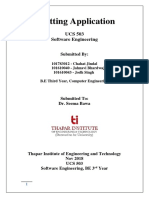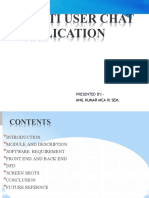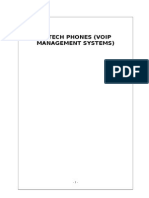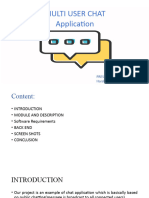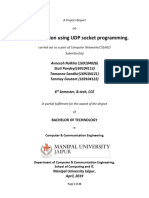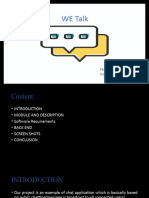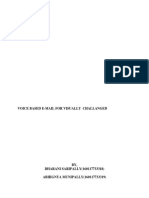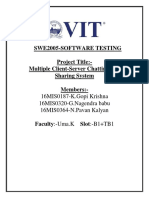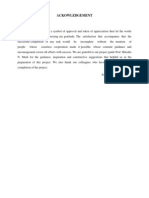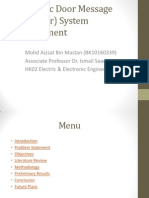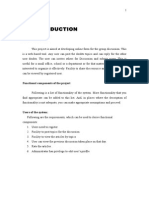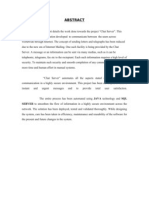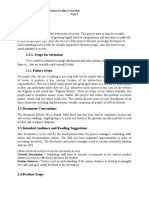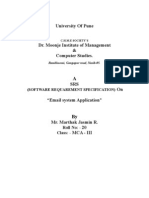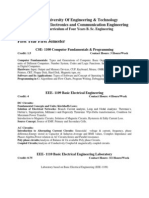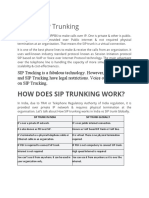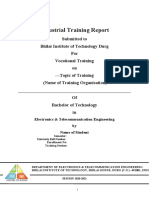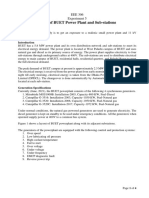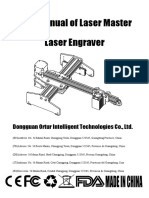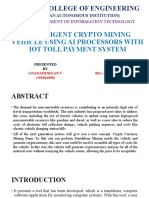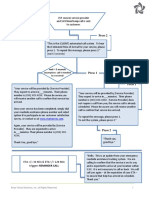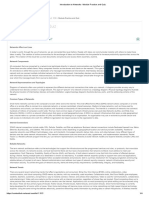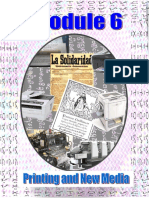FORMAT OF SOFTWARE REQUIREMENT ANALYSIS
1 Introduction 1.1 Purpose 1.2 Scope 1.3 Definitions, Acronyms & Abbreviations 1.4 References 1.5 Overview 2 Overall Description 2.1 Product Perspective (Relationship) 2.2 Product Functions 2.3 User Characteristics 2.4 General Constraints 2.5 Assumptions & Dependences 3 Specific Requirements 3.1 External Interface Requirements 3.1.1 User Interface 3.1.2 Hardware Interface 3.1.3 Software Interface 3.1.4 Communication Interface 3.2 Functional Requirement 3.2.1 Mode 1 3.2.1.1 Functional Requirements of 1.1 3.2.1. N Functional Requirements of 1.n 3.2.1. M Functional Requirements of 1.m 3.3 Performance Requirement 3.4 Design Constraints 3.5 Attributes 3.6 Other Requirements
ABOUT INTERACTIVE MESSENGER
The Interactive Messenger we developed has incorporated features like instant messaging, audio conferenceing,video conferencing, text to speech reader and white board .It boasts of having a database that authenticate the user and keep track of them .The messenger is based on client server architecture .It enables peer-to-peer communication between clients during video conferencing. The various functionalities of different entities of the software tool are listed below
Instant Messaging:
�This functionality enables the user to pass textual messages between the users .It is of two type private chat and public chat.
Audio conferencing:
This feature facilitates conversation between two clients
Video Conferencing:
It enables visual communication between the two clients
Text To Speech Reader:
This unique functionality helps in the translating text to audible format. Text to speech reader lets you listen to text instead of reading on the screen. It also allows you to convert text into a MP3\WAV file so you can listen later. Create MP3files from your email, news articles and any text you want
White Board:
It enables clients to draw and type simultaneously
2. THE EXISTING SYSTEM
o Yahoo Messenger o Intra Chat o MessengerLog4 Pro o MSN Messenger o LAN Spirit o ActivePost Basic
2.1 Limitations of the Existing System
There are various drawbacks for the existing system. They are
�1) Not very user friendly 2) Errors may occur while logining 3) Maintenance of files becomes cumbersome 4) Searching report is a tedious job 5) Time consuming
3.0 MINIMAL SYSTEM REQUIREMENTS
The hardware and software for the development has been selected based on several factors such as Support Cost effectiveness Development speed Ability to create robust application in the least time Stability
3.1 OPTIMUM HARDWARE REQUIREMENTS
SYSTEM IBM COMPATIBLE PC PROCESSOR PENTIUM 3 SYSTEM MEMORY 128 MB HDD SPACE 8 MB FOR COMPLETE INSTALLATION MONITOR SVGA COLOR MONITOR ADDITIONAL PERIPHERALS REQUIRED WEB CAM, LIGHT PEN MICROPHONE
3.2 OPTIMUM SOFTWARE REQUIREMENTS
Operating System Win 9x\Xp\Nt Front End Tool MICROSOFT VISUAL BASIC. NET Back End Tool Oracle 10
3.3 OPTIMUM NETWORK REQUIREMENTS
A sound card A video card LAN card A LAN connection
USE-CASE DIAGRAM
�The use-case model is a model of proposed systems desired functions and its environment. It serves as a contract between the customer and the developers. The Use-case model is used as an essential input to activities in analysis, design, and text. The use-model is comprised of: .Use-case . Actor .Use case diagrams
CONCLUSION
This project has given a satisfactory solution for new age communication. The output is obtained according to the requirements. This software can be updated in the future. The project is user friendly. Security is the main consideration in this project. All the necessary validations are carried out in this project so that any kind of the users can make use of this software. This software is protected from any unauthorized access by giving user name and password during login process.
FUTURE ENHANCEMENTS
In future we can implement and integrate Speech to Text functionality with the existing system. Thus it can lend a helping hand to blind users for communication. We also considering its prospective on its applicability in internet, and intranet also

